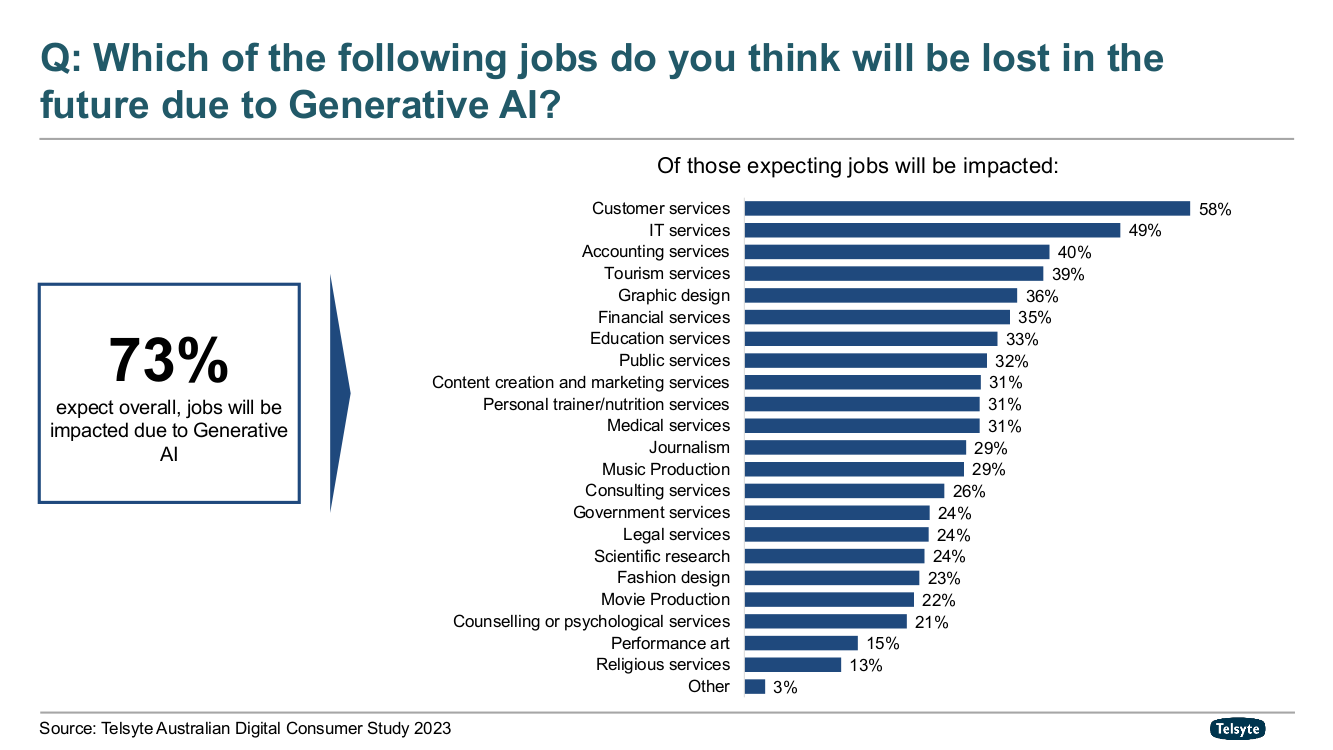One million Australians were already using ChatGPT in January 2023
SYDNEY, AUSTRALIA – Australians are showing strong interest and rapidly adopting new Generative AI applications such as Open AI’s ChatGPT, according to new research from the Australian emerging technology analyst firm, Telsyte.
One in five Australians aged 16 and older were already aware of ChatGPT, and one million Australians were already using it according to a survey conducted by Telsyte in mid-January 2023, just a month and a half since the release of ChatGPT.
The study also found that one in three (34%) Australians is already interested in using Generative AI chatbots like ChatGPT for various tasks such as language translation (44%), brainstorming ideas (34%), summarising long documents (33%), and helping with research (27%). The intention rises to 49 per cent among young Australians aged 18 to 34s.
With many learning and discovering the potential of Generative AI, the research also found that 33 per cent of the Australian workforce interested in the technology intends to use it for work.
However, the study also reveals some challenges and risks associated with Generative AI. Nearly half (49%) of Australians anticipate significant changes to the workforce and job requirements in the future due to the growing prevalence of AI-based machines and software.
Only 29 per cent of the current workforce is willing to train machines or software to take over part of their own work, as well as part of someone else’s work (29%).
A workforce that could look very different in 10 years’ time because of AI
The Australian workforce is preparing for a future workplace that might look very different in a decade. In fact, 35 per cent of workers already expect that machines, AI, or robots could perform their roles in the future.
Of those who think machines could do their roles, 42 per cent think part of their roles will be replaced in five years, while a staggering 71 per cent think this will happen in 10 years.
When asked about the possibility of their roles being fully taken over by machines or AI, 30 per cent of the workforce think this could happen in a decade. This figure rises to 57 per cent when the timeframe is extended to 20 years.
Overall, almost three-quarters (73%) of Australians anticipate future jobs will be affected by Generative AI. The top perceived roles include customer services (58%), IT services (49%) accounting services (40%), tourism (39%) and graphic design (36%).
“The Australian workforce want to reduce the workload, but are wary AI might replace them”, says Foad Fadaghi, Principal Analyst and Managing Director at Telsyte.
“Generative AI has the potential to transform many industries and sectors, but it also poses some ethical and social implications that need to be carefully considered and addressed,” says Foad Fadaghi.
Incoming AI-as-a-Service
As generative AI models and APIs become more accessible and versatile, Telsyte anticipates that more paid AI assistance services like ChatGPT Plus will emerge in 2023.
The study revealed that 9 per cent of Australians would pay for AI assistance subscriptions to assist them with their daily tasks and queries, especially those aged 25 to 34s (15%) and those working in the professional (16%) and education (16%) sectors.
On average, those who would pay for AI subscriptions are willing to spend around just under $10 per month. However, 37 per cent of respondents would pay over $10 per month, suggesting a potential market for prosumer applications.
For further information on the study or media enquiries contact:
Foad Fadaghi
Managing Director
Tel: 1800 313 142
Email: ffadaghi@telsyte.com.au
Alvin Lee
Senior Analyst
Tel: 1800 313 142
Email: alee@telsyte.com.au
The Telsyte Australian Digital Consumer Study 2023 is a comprehensive study that provides subscribers with analyst content and services covering:
Key technology, services and lifestyle trends
Adoption and 4-year forecast of personal technologies (e.g. smartphones, smartwatches, tablets, 2-in-1s, computers, XR headsets, etc)
Adoption and 4-year forecast of household technologies (e.g., smart speakers, smart TVs, gaming consoles, Chromecast, Amazon Fire TV, Apple TV and other set-top boxes, etc)
Generative AI and other AI/automation applications
Post-PC device preferences and intentions
Wearable technology preferences and intentions
NBN, 5G and broadband
Mobile services
Digital video, Pay TV, Streaming video, television (including broadcast video on demand)
Social media
Technology, social and online apps adoption amongst children under 18s
Digital services and gig economy
Digital payments, banking and eCommerce trends
Interactive games and cloud gaming
Cybersecurity, privacy and consumer cloud
Attitudes to lifestyle and technology
In preparing this study, Telsyte used:
Telsyte’s annual Digital Consumer survey conducted during January 2023 with a representative sample of 1,036 respondents, 16 years and older.
Interviews with executives from service providers, network operators, manufacturers, retailers, financial analysts and channel partners.
Financial reports released by service providers, manufacturers and retailers.
On-going monitoring of local and global market and vendor trends.
About Telsyte
Telsyte is Australia’s leading emerging technology analyst firm. Telsyte analysts deliver market research, insights and advisory into enterprise and consumer technologies. Telsyte is an independent business unit of DXC Technology. For more information visit www.telsyte.com.au
The material in this article is copyright protected and not intended to be altered, copied, distributed or used for any commercial or non-commercial purpose, except for news reporting, comment, criticism, teaching and scholarship.


